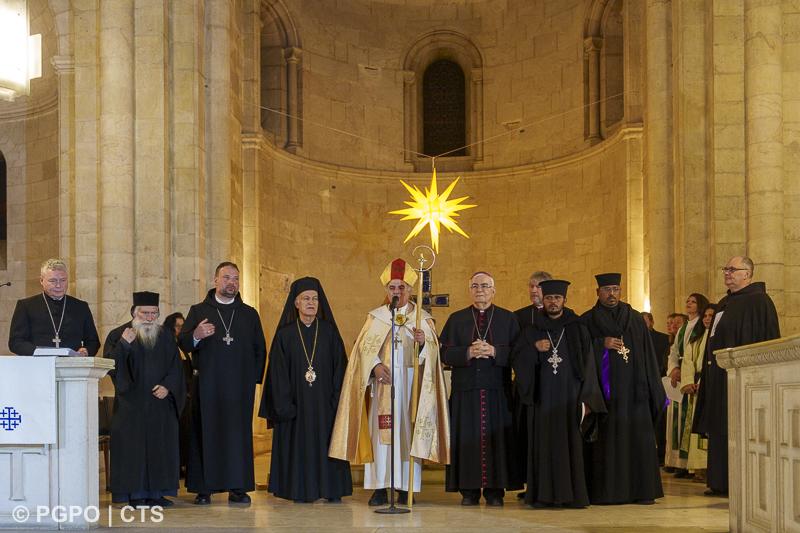The “Week of Prayer for Christian Unity”, on the topic “You will love the Lord your God… and your neighbour as yourself” (Luke 10,27) was held in the Holy Land from 20 to 28. These words echo like a real challenge in the present-day context of the Holy Land, shaken by war for four months now. In Jerusalem, every day, for nine days, the Gospel according to Luke which recounts the parable of the Good Samaritan, resounded in nine different Christian churches.
Unity and peace
This year, the prayer was particularly heartfelt. In addition to the request for unity between the disciples of Christ there was the intention for a newfound peace in the Holy Land. “This appointment is all the more significant at a time characterized by conflict, hatred and a desire for vendetta instead of yearning for unity and reconciliation,” the Custos of the Holy Land, fra Francesco Patton, emphasized in the ecumenical prayer in the Franciscan church of St Saviour on 25 January.
The dates of the Week of Prayer

The various appointments saw a large presence of faithful and religious. Unfortunately, the participation of local Christians, who effectively live in an ecumenism, especially in the families, where often couples belong to different Churches or rites, remains very marginal. The “Week of Prayer for Christian Unity” in the Holy Land begins on the Saturday following the Armenian Christmas (19 January). As per tradition, the first appointment was at the Holy Sepulchre, for the Greek Orthodox office of the Apodeipnon, or Compline, at the altar of the Crucifixion on Mount Calvary.
A response to the persecutors
On Sunday 21 January, the prayer was hosted by the Anglicans, in St George’s cathedral and on Monday 22 by the Armenian Apostolic Church, in St James’ Cathedral in the Armenian compound. “Our unity as Christians is a powerful response to the forces that are trying to put out the light of Christ in this land,” fr. Aghan Gogchyan, chancellor of the Armenian Patriarchate said in his sermon. “Our collective testimony, our shared prayers and our indestructible reciprocal support show the strength of our common faith.”
United in suffering
On Tuesday 23 January, the ecumenical prayer was held in the Lutheran Church of the Redeemer, close to the Holy Sepulchre. The next day, Wednesday 24 January, the Franciscans of the Custody of the Holy Land animated the ecumenical prayer in St Saviour’s church. “As Christians in the Holy Land we already have an ecumenical element which unites us, that of common suffering,” the Custos of the Holy Land said in his homily. ”We are targeted simply because we are Christians. Those who want to attack us already see us as a single body.”
The dream of unity
On Thursday 25 January, the prayer was held at the Cenacle, on Mount Zion, the room which, according to tradition, is believed to have hosted the Last Supper of Jesus with the disciples, during which the Eucharist was established. After being passed from one hand to another, and today incorporated in the Jewish complex of David’s Tomb, the Christians of Jerusalem can gather in prayer in this place only on some days of the year. The Franciscans of the Custody of the Holy Land, who had their first convent here, are now only a few dozen yards away.
The celebration in the Cenacle was entrusted to the monks of the nearby Dormition Abbey and was animated by the theology students of the studienjahr, an ecumenical study programme connected to the abbey. The abbot, Father Nikodemus Schnabel, presided over the prayer and in his homily he shared with those present a dream: that in 2025 – when the Churches of the Orient and of the West celebrate together Easter and Pentecost, and 1700 years after the Council of Nicaea, which all Christians accept, “we can bring together in the Cenacle all the heads of the Churches. It would be a strong sign for the world from Jerusalem, that we are united as Christians.”
On Friday 26 January, the ecumenical prayer for Christian unity was hosted for the first time in St George’s church of the Orthodox Copts, while on Saturday 27 January it was held in the church of the Ethiopian Orthodox community.
The Week of Prayer for Christian Unity came to an end on Sunday 28 January in the church of the Annunciation of the Greek Catholics (Melkites) in the Old City of Jerusalem.






